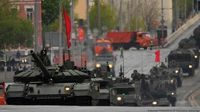Chinese President Xi Jinping is currently on a state visit to Russia from May 7 to May 10, 2025, to commemorate the 80th anniversary of the Soviet Union's victory in the Great Patriotic War. This marks Xi's 11th visit to Russia since he took office, highlighting the significance of the relationship between the two nations. The backdrop of this visit is particularly notable as it takes place amid ongoing tensions due to Russia's invasion of Ukraine, which has now persisted for three years.
The Kremlin has announced that 29 foreign leaders are expected to attend the Victory Day parade in Moscow, alongside military contingents from 13 countries, including China. The event is seen as a critical diplomatic occasion, especially considering the historical context and current geopolitical climate. Xi's presence at the parade, which includes inspecting the military alongside Russian President Vladimir Putin, underscores the deepening ties between China and Russia.
One of the most anticipated aspects of the visit is the potential for a rare public appearance by Xi, Putin, and North Korean leader Kim Jong-un. Although not officially confirmed, reports suggest that preparations are underway for Kim's attendance, which would carry significant political implications. This would be the first time since the Korean War that leaders from China, Russia, and North Korea have appeared together publicly, symbolizing a united front against perceived Western aggression.
As Xi arrived in Moscow on May 7, the situation was tense. Just hours before his arrival, one of Moscow's main airports was temporarily closed due to threats from Ukrainian drones. This led to heightened security concerns regarding the safety of foreign dignitaries attending the parade. Ukrainian President Volodymyr Zelensky has previously stated that any security assurances for visiting leaders are Moscow's responsibility, highlighting the precarious nature of the situation.
In a press conference, Zelensky expressed skepticism about Russia's proposed three-day ceasefire during the parade, describing it as a mere publicity stunt. He emphasized that Ukraine cannot guarantee the safety of guests at the parade, given the ongoing conflict. The Kremlin's spokesperson Dmitry Peskov responded by asserting that the ceasefire proposal is meaningful, yet warned that any continued attacks from Ukraine would prompt an immediate Russian response.
Meanwhile, reactions from other countries have varied. Slovak Prime Minister Robert Fico, the only EU leader attending the parade, has faced criticism for his decision, which some view as tacit support for Russia's actions in Ukraine. On the other hand, leaders from countries such as Brazil, Armenia, Azerbaijan, and Vietnam are also expected to join the celebrations, further emphasizing the geopolitical ramifications of the event.
In the broader context of international relations, Xi's visit comes at a time when U.S.-China trade tensions are escalating. Following a series of retaliatory tariffs imposed by the U.S., which have reached as high as 245% on certain Chinese goods, Xi's government has been actively seeking to strengthen ties with other nations to mitigate the impact of these economic pressures. Notably, Xi recently visited Southeast Asia, where countries like Vietnam and Cambodia have been significantly affected by U.S. tariffs.
On May 6, 2025, China and the European Parliament announced the lifting of restrictions on bilateral exchanges, signaling a potential thaw in relations following years of tension over issues like human rights in Xinjiang. This development may suggest that China is looking to diversify its economic partnerships, particularly in light of the ongoing trade war with the U.S.
As Xi and Putin prepare for their discussions, the agenda is expected to cover various critical issues, including the ongoing conflict in Ukraine and the evolving U.S.-Russia relationship. Observers are keenly interested in whether Xi will announce new cooperative initiatives, particularly in areas such as energy and defense.
Despite the risks associated with his visit, Xi's participation in the parade is seen as a show of solidarity with Putin, reinforcing China's pro-Russian stance. This has drawn criticism from Western nations, who view China's actions as an endorsement of Russia's aggressive policies. In a recent article published in the Russian newspaper Pravda, Xi criticized U.S. unilateralism and hegemony, framing the current global landscape as a critical juncture where justice must prevail over aggression.
The upcoming Victory Day parade is not just a celebration of past military triumphs; it is a reflection of the current geopolitical landscape, where alliances are being tested, and the balance of power is shifting. With Xi's high-profile visit, the world will be watching closely to see how these relationships evolve and what new strategies may emerge from this gathering of leaders.
As the parade approaches, the atmosphere remains charged with anticipation and tension, particularly given the recent escalation of drone attacks from Ukraine, which have disrupted air travel in Moscow. The Kremlin has assured that all necessary measures are being taken to ensure the safety of the event, but the shadow of ongoing conflict looms large over the festivities.
In summary, Xi Jinping's visit to Russia amid the backdrop of the Victory Day celebrations represents a significant moment in international relations, highlighting the complexities of alliances in a world marked by conflict and competition. As leaders gather in Moscow, the implications of their discussions will resonate far beyond the parade, shaping the future of global diplomacy.

